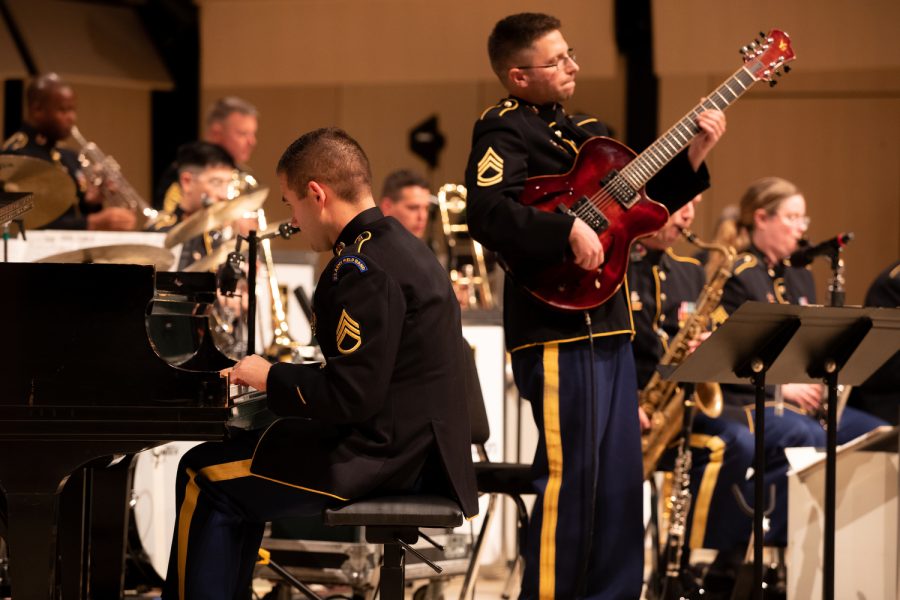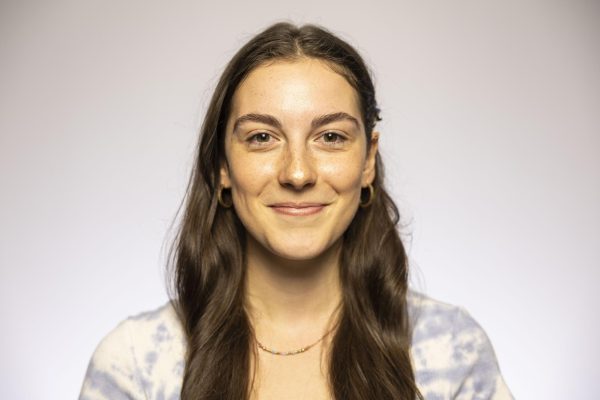U.S. Army “Jazz Ambassadors” Big Band connects civilians with Army through music
On Nov. 10, the U.S. Army “Jazz Ambassadors” Big Band performed at Voxman Music Building, honoring veterans in the audience and making a connection between the Army and civilians.
Pianist Staff Sergeant Anthony Pocetti and Guitarist Sergeant First Class Johnathan Epley perform during The United States Army Field Band “Jazz Ambassadors” Big Band concert in the Voxman Concert Hall Thursday Nov. 10, 2022.
November 11, 2022
As audience members took their seats, the Jazz Ambassadors stood onstage in crisp military uniforms, light gleaming off of their brilliant brass instruments. On Thursday night, Nov. 10, the Voxman Concert Hall offered crowds refuge from the cold rain for a special jazz performance.
The “Jazz Ambassadors” Big Band is the touring jazz band of the U.S. Army. It was formed in 1969 and is made up of nineteen members. The Jazz Ambassadors have performed in all fifty states and abroad. This performance in Iowa City marks the tenth day of their seventeen-day Midwest tour.
The concert began with a presentation of colors and a soulful rendition of the National Anthem, sung by band vocalist Sergeant First Class Randy Wight. It was followed by “Afternoon of a Prawn” by Bob Florence, a fast-paced piece that featured the talents of saxophone soloists playing their instruments in cascades of musical notes.
Chief Warrant Officer 3 Alexander Davis, director of the Jazz Ambassadors, introduced the next song as a celebration of life, based on what is called the “second line” of a New Orleans funeral. A second line is a parade procession that anyone can join following the first line, which is composed of the hearse, family, and close friends.
The song, “New Orleans Suit VI. Second Line,” felt like a celebration, starting slower before quickly exploding with vivacious energy. With a light and lovely clarinet solo as well as a trumpet solo that climbed musical range, the piece was difficult not to tap a foot to.
New Orleans, being the birthplace of jazz, influenced several pieces of the performance, and those pieces happened to be a highlight of the show for high school senior and Iowa City Jazz program trumpet player Eli Cotton.
“Those are some of my favorite styles of jazz, and hearing them executed so well, especially with the clarinet and the trumpet, I really liked that,” said Cotton.
The next song, “Lament,” took on a different tone and slowed the tempo down. Led by a trombone solo from the band’s newest member, the emotional music felt like something to sway gently to. The band’s percussionist added to the atmosphere with brushes on the drums that mimicked the sound of rain in the background.
Wight returned to the stage for the next few pieces, gracing everyone with smooth vocals and great projection. His lyrics guided the pieces through visuals of romantic moments, joyful declarations of love, and autumn strolls in chilly air and crunching leaves.
RELATED: UI symphony orchestra’s first performance of the year kicks off with diverse ensemble
In “Passion Dance,” the next completely instrumental piece, all of the different sounds of the band layered each other as if in conversation with one another. The instruments seemed to communicate with each other as the tempo and rhythm progressively changed to produce one unit of music.
The band was able to create this unit with talent and comradery between musicians.
“I sit next to musicians that inspire me every single night,” said Sergeant Major John Altman, fifth trumpet and road manager. “Everybody takes a turn inspiring the person on their left and the person on their right because we are a team and we work really well with relying on each other to take up your five percent of the product, and that’s a really wonderful team effort going on.”
Following three more lively pieces — one of which was performed by a traditional jazz trio made up of a trumpet player, a trombone player, a clarinet, and the percussion section — was an Armed Forces Salute to all of the active and retired veterans in the audience.
Davis saluted each soldier in the audience who stood in a highly respectful display. In those musical moments of honor, the audience and the band made a clear connection.
“Music connects everybody no matter where they are, if they’re in the Army, school, high school, college, it really lets people know that music, especially jazz, connects everybody,” said Kirkwood freshman undergraduate Aysa Teal-Goerdt, who was in attendance with Cotton.
The Jazz Ambassadors strive to create connections between the public and the Army everywhere at every show. After performances, they make an effort to meet the veterans in the audience to thank them for their service and exchange stories and experiences.
When the Jazz Ambassadors are not performing, they are participating in educational outreach to high school jazz programs, like at Iowa City West High School.
According to Altman, engaging with “the next generation of jazz musicians that are trying to make their way through the educational institutions” is a very rewarding experience. It allows the Jazz Ambassadors to raise awareness of the performance opportunities in the Army and support aspiring jazz musicians.
The concert ended with Wight’s rendition of “America the Beautiful” and an energetic encore that earned a standing ovation. According to Cotton, the unifying concert offered a temporary respite from “a world right now where so often there is so much disconnect and so much tension” between people.
“I didn’t really feel tense in there, and I felt like this was a way that we had a government organization in the Army come in with this music and it felt like this was something that everyone could support,” Cotton said.















